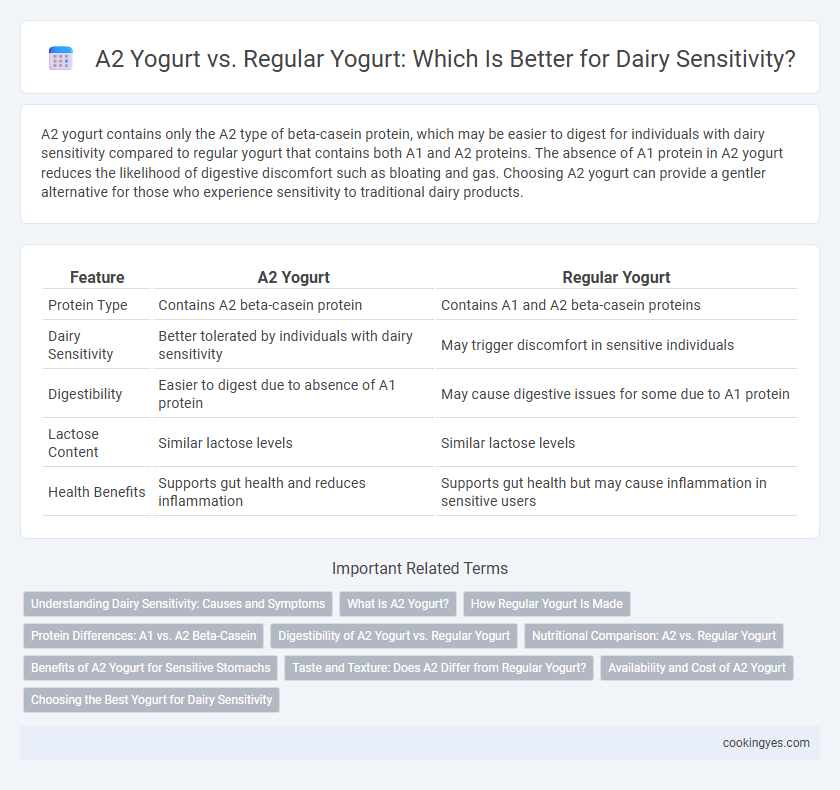A2 yogurt contains only the A2 type of beta-casein protein, which may be easier to digest for individuals with dairy sensitivity compared to regular yogurt that contains both A1 and A2 proteins. The absence of A1 protein in A2 yogurt reduces the likelihood of digestive discomfort such as bloating and gas. Choosing A2 yogurt can provide a gentler alternative for those who experience sensitivity to traditional dairy products.
Table of Comparison
| Feature | A2 Yogurt | Regular Yogurt |
|---|---|---|
| Protein Type | Contains A2 beta-casein protein | Contains A1 and A2 beta-casein proteins |
| Dairy Sensitivity | Better tolerated by individuals with dairy sensitivity | May trigger discomfort in sensitive individuals |
| Digestibility | Easier to digest due to absence of A1 protein | May cause digestive issues for some due to A1 protein |
| Lactose Content | Similar lactose levels | Similar lactose levels |
| Health Benefits | Supports gut health and reduces inflammation | Supports gut health but may cause inflammation in sensitive users |
Understanding Dairy Sensitivity: Causes and Symptoms
A2 yogurt contains only A2 beta-casein protein, which may reduce digestive discomfort in individuals sensitive to A1 beta-casein found in regular yogurt. Dairy sensitivity symptoms like bloating, gas, and stomach cramps arise from difficulty digesting A1 protein or lactose intolerance. Choosing A2 yogurt can help alleviate these symptoms by minimizing exposure to the problematic A1 beta-casein, offering a gentler alternative for sensitive consumers.
What Is A2 Yogurt?
A2 yogurt contains only the A2 type of beta-casein protein, which is believed to be easier to digest for individuals with dairy sensitivity or lactose intolerance. Regular yogurt typically includes both A1 and A2 beta-casein proteins, with A1 potentially triggering digestive discomfort in sensitive individuals. Choosing A2 yogurt may reduce symptoms such as bloating and gas, making it a preferable option for those with mild dairy intolerance.
How Regular Yogurt Is Made
Regular yogurt is made by fermenting milk with specific bacterial strains, primarily Lactobacillus bulgaricus and Streptococcus thermophilus, which convert lactose into lactic acid. This process thickens the milk and gives yogurt its tangy flavor, but does not significantly reduce lactose content, making it less suitable for individuals with dairy sensitivity. Unlike A2 yogurt, regular yogurt is typically produced from milk containing both A1 and A2 beta-casein proteins, which may contribute to digestive discomfort in sensitive individuals.
Protein Differences: A1 vs. A2 Beta-Casein
A2 yogurt contains only the A2 beta-casein protein, which may be easier to digest for individuals with dairy sensitivity compared to regular yogurt that contains both A1 and A2 beta-casein proteins. Studies suggest that A1 beta-casein can trigger gastrointestinal discomfort, whereas A2 beta-casein is less likely to cause inflammation or digestive issues. Protein composition differences in A2 yogurt offer a potentially gentler alternative for those experiencing lactose intolerance or milk protein sensitivity.
Digestibility of A2 Yogurt vs. Regular Yogurt
A2 yogurt contains only the A2 beta-casein protein, which may reduce digestive discomfort for individuals sensitive to regular yogurt's A1 protein. Studies suggest that A2 protein produces fewer inflammatory peptides during digestion, enhancing tolerance in people with mild dairy sensitivities. Regular yogurt, containing both A1 and A2 proteins, can trigger digestive issues like bloating and gas in sensitive individuals, making A2 yogurt a preferable choice for improved digestibility.
Nutritional Comparison: A2 vs. Regular Yogurt
A2 yogurt contains only A2 beta-casein protein, which is easier to digest for individuals with dairy sensitivity compared to regular yogurt that contains both A1 and A2 proteins. Nutritionally, A2 yogurt offers similar levels of calcium, protein, and probiotics but may reduce digestive discomfort such as bloating and gas. For sensitive consumers, choosing A2 yogurt can enhance nutrient absorption and improve gut health without compromising essential dairy nutrients.
Benefits of A2 Yogurt for Sensitive Stomachs
A2 yogurt contains only the A2 beta-casein protein, which is easier to digest for people with dairy sensitivity compared to regular yogurt that includes both A1 and A2 proteins. Studies show that A2 beta-casein may reduce gastrointestinal discomfort such as bloating, gas, and diarrhea, promoting better digestion and nutrient absorption. This makes A2 yogurt a beneficial option for individuals with sensitive stomachs seeking the probiotic and calcium benefits of traditional yogurt without digestive distress.
Taste and Texture: Does A2 Differ from Regular Yogurt?
A2 yogurt, made exclusively from A2 beta-casein protein milk, often has a creamier texture and milder taste compared to regular yogurt containing both A1 and A2 proteins. Individuals with dairy sensitivity may find A2 yogurt easier to digest due to the absence of A1 protein, which can influence flavor profiles and decrease digestive discomfort. The subtle sweetness and smooth consistency of A2 yogurt make it a preferred choice for those seeking a gentle yet flavorful dairy option.
Availability and Cost of A2 Yogurt
A2 yogurt, derived from cows producing only the A2 beta-casein protein, is less widely available than regular yogurt, often found primarily in specialty health stores or online retailers. The cost of A2 yogurt tends to be higher due to limited supply and the specialized nature of sourcing milk from A2-producing cows. Consumers with dairy sensitivity may face challenges finding affordable A2 yogurt options compared to more commonly available regular yogurt products.
Choosing the Best Yogurt for Dairy Sensitivity
A2 yogurt contains only the A2 beta-casein protein, which may reduce digestive discomfort for individuals with dairy sensitivity compared to regular yogurt that contains both A1 and A2 proteins. Studies suggest that A2 beta-casein is easier to digest and less likely to trigger inflammation or digestive issues often linked to A1 beta-casein in regular dairy products. Selecting A2 yogurt can be a beneficial option for those experiencing mild lactose intolerance or sensitivity to conventional dairy proteins.
A2 yogurt vs regular yogurt for dairy sensitivity Infographic

 cookingyes.com
cookingyes.com